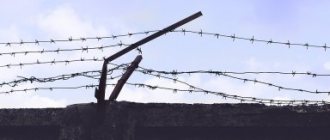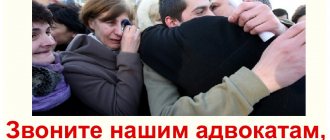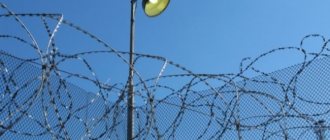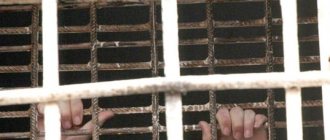If you need assistance of a legal nature (you have a complex case and you don’t know how to fill out documents, the MFC unreasonably requires additional papers and certificates or refuses them altogether), then we offer free legal advice:
- For residents of Moscow and Moscow Region - +7 (495) 332-37-90
- St. Petersburg and Len. region - +7 (812) 449-45-96 Ext. 640
Criminal liability is established for interfering with the professional activities of journalists in the form of forcing them to disseminate or refuse to disseminate information. The main direct object of this crime is the procedure for the professional activities of journalists regulated by the legislation of the Russian Federation [1]. This law provides for a wide range of actions that may interfere with the professional activities of journalists, but criminal liability is established only for acts in the form of forcing them to disseminate or refuse to disseminate information. The victim of this crime may be a person who has the professional status of a journalist. In accordance with the above law, this status applies to:. The objective side of the composition provided for in Art.
Theft committed repeatedly, or by prior conspiracy by a group of persons, or with penetration into a home, premises or other storage, as well as causing significant damage to the victim, - Theft committed on a large scale, or by an organized group, or by a particularly dangerous repeat offender -.
Theft committed repeatedly, or by prior conspiracy by a group of persons, or with penetration into a home, premises or other storage, as well as causing significant damage to the victim, - Theft committed on a large scale, or by an organized group, or by a particularly dangerous repeat offender -. In articles - Repeated in articles , , ,
Article 144 part 2 of the Criminal Code of the RSFSR
Theft committed repeatedly, or by prior conspiracy by a group of persons, or with penetration into a home, premises or other storage, as well as causing significant damage to the victim, - Theft committed on a large scale, or by an organized group, or by a particularly dangerous repeat offender -. In the articles - Repeated in the articles , , , Robbery committed repeatedly, or by prior conspiracy by a group of persons, or with penetration into a home, premises or other storage facility, or combined with violence not dangerous to the life and health of the victim -.
Robbery committed on a large scale, or by an organized group, or by a particularly dangerous repeat offender -. If you need help with legal references, you have a complex case, and you don’t know how to draw up documents, the MFC unreasonably requires additional papers and certificates, or refuses them altogether, then we offer free legal advice: The media and media propaganda are periodicals, radio, television, video programs, newsreels, and other forms of periodic dissemination of mass information.
Periodical printed publications include a newspaper, magazine, almanac, bulletin, or other publication that has a permanent name, current issue and is published at least once a year.
A radio, television, video, newsreel program is understood as a set of periodic audio, audiovisual messages and broadcast materials, which has a permanent name and is broadcast at least once a year, see.
Acts provided for in parts one or two of this article, coupled with violence against a journalist or his relatives or with damage or destruction of their property, as well as the threat of using such violence, are punishable by forced labor for a term of up to five years or imprisonment for a term of up to six years. years with or without deprivation of the right to hold certain positions or engage in certain activities for a period of up to three years.
The objective side of the crime is expressed in the obstruction of the legitimate professional activities of a journalist. Article of the Criminal Code of the Russian Federation old code Repeated in articles , , ,. Article 1. Criminal Code. Article 2. Criminal Code of the RSFSR and all-Union criminal law, part two; aggravated theft article, parts two and.
Register Login. Mail replies. Questions - leaders I discovered the essence of the name Nazivin 1 bet. Recalculation of utilities when changing the management company 1 rate. Is it possible to buy broken phones on the market? Penalty for late license??? They wrote all sorts of nasty things about me on one of the sites! Leaders of the category Anton Vladimirovich Artificial Intelligence. Sour Supreme Intelligence.
Article by Artem Pupil, closed 11 years ago. Best answer. User deleted Expert 11 years ago I don’t remember exactly. But this is a crime against property. That means it's theft. Other answers. Skvortsov Alexander Thinker 11 years ago Theft on a large scale, or committed by a particularly dangerous repeat offender. MT Guru 11 years ago Article Theft Secret theft of personal property of citizens theft is punishable by imprisonment for up to two years or correctional labor for the same period.
Theft, committed repeatedly or by prior conspiracy by a group of persons or causing significant damage to the victim, is punishable by imprisonment for a term of up to five years with or without confiscation of property, or correctional labor for a term of one to two years with or without confiscation of property.
Theft with penetration into a home is punishable by imprisonment for a term of two to seven years with or without confiscation of property.
Theft committed by a particularly dangerous repeat offender is punishable by imprisonment for a term of four to ten years with confiscation of property.
In Articles , , , a repeated crime is recognized as committed by a person who has previously committed any of the crimes provided for in these articles or in Articles 77, 89 - User deleted Sage 11 years ago specifically in the year it sounded like this: Article Theft Secret theft of personal property of citizens theft - is punishable by imprisonment for a term of up to two years or correctional labor for a term of up to one year.
Theft committed repeatedly, or by prior conspiracy by a group of persons, or with the use of technical means, or which caused significant damage to the victim, is punishable by imprisonment for a term of up to five years. Theft committed by a particularly dangerous repeat offender is punishable by imprisonment for a term of four to ten years. A crime committed by a person who has previously committed any of the crimes provided for by these articles or articles 77, 89 - 93 of this Code is recognized as repeated in articles .
But then changes were made to this article several times. The above is the 1989 edition. Natalya Britvina Guru 11 years ago, if memory serves, then theft, and part 3, in my opinion, involved illegal entry into a home. The Criminal Code of the RSFSR has the task of protecting the social system of the USSR, its political and economic systems, personality, rights and freedoms of citizens, all forms of property of the entire socialist legal order from criminal attacks.
To accomplish this task, the Criminal Code of the RSFSR determines which socially dangerous acts are criminal and establishes the penalties to be applied to persons who have committed crimes. All-Union laws on criminal liability for state crimes and military crimes, as well as all-Union laws defining liability for other crimes directed against the interests of the USSR, are included in this Code.
The general part of the Code applies both to the acts specified in this Code and to acts for which liability is provided for by all-Union laws that have not yet been included in this Code. Only a person guilty of committing a crime, that is, who intentionally or through negligence committed a socially dangerous act provided for by criminal law, is subject to criminal liability and punishment.
In the articles - Repeated in the articles , , , The requirement to transfer someone else's property or the right to property or to perform any actions of a property nature under the threat of disclosing defamatory information about the person or his relatives, in the ownership, control or protection of which this property is located - Article Code of Criminal Procedure of the Russian Federation.
Procedure for considering a report of a crime 2. Based on a report of a crime disseminated in the media, the investigation is carried out on behalf of the prosecutor by the inquiry body, as well as on the instructions of the head of the investigative body by the investigator. The editorial office and the editor-in-chief of the relevant mass media are obliged to hand over, at the request of the prosecutor, investigator or body of inquiry, the documents and materials at the disposal of the relevant mass media confirming the report of a crime, as well as information about the person who provided the specified information, except in cases where this the person set a condition to keep the source of information secret.
Federal Law No. Federal Law -. Article Theft. Secret theft of someone else's property. Article Note. In the articles, theft is understood as an unlawful act committed for mercenary purposes. The President of the Russian Federation signed a law on easing “entrepreneurial clauses”. Kudaeva tore the gold chain from Uzdenova’s neck and, taking advantage of the trolleybus stop, jumped out of the door and tried to escape, but was detained by Uzdenova.
In the new edition of the criminal law under Part. What does it mean to conduct an inspection in accordance with Art. Obstructing the legitimate professional activities of journalists by forcing them to disseminate or refuse to disseminate information -. Acts provided for in parts one or two of this article, coupled with violence against a journalist or his relatives or with damage or destruction of their property, as well as with the threat of using such violence, -.
According to Part. No one can be forced to express their opinions and beliefs or to renounce them. These constitutional guarantees are provided by the Law of the Russian Federation dated In accordance with Art. The content of the signs of the objective side of the crime must be determined based on Art.
A journalist is a person who collects, creates, edits or prepares materials for the media, is associated with them through labor or other contractual relations, or is engaged in such activities under their authority. Federal Law of June 13. Criminal Code of the Russian Federation of June 13.
The Criminal Code of the RSFSR has the task of protecting the Soviet social and state system, socialist property, personality and rights of citizens and the entire socialist legal order from criminal attacks.
To accomplish this task, the Code determines which socially dangerous acts are criminal and establishes the penalties to be applied to persons who have committed crimes. The social danger of the crime lies in undermining the constitutional guarantee of freedom of thought and speech, freedom of the media, the prohibition of censorship, as well as the constitutional right to freely seek, receive, transmit, produce and disseminate information in any legal way Art.
The crime violates the right of citizens to reliable and complete information about events, phenomena and processes occurring in the country and abroad. Abstract - free, delivery 10 minutes, 24 hours a day, seven days a week, seven days a week. Krasilnikova Elena Valerievna. Obstruction of the legitimate professional activities of journalists Art. Chapter 1 - Concept and means of legislative technology and differentiation of criminal liability Chapter II. Problems of understanding the main signs of obstruction of the legitimate professional activities of journalists Art.
The use of certain means and techniques of legislative technology in the construction of Art. Notify me of a response to my comment by e-mail. Skip to content Medical law Tax law Labor law Land law Administrative law Financial law Civil law Budget law Legal advice.
Did you like the article? Share with friends:. You may also be interested. . No comments yet Add a comment Cancel reply.
By submitting a comment, you consent to the collection and processing of personal data.
Article 144. Theft
Federal Law of June 13, Criminal Code of the Russian Federation of June 13, No. Federal Law. The Criminal Code of the RSFSR has the task of protecting the Soviet social and state system, socialist property, personality and rights of citizens and the entire socialist legal order from criminal attacks. To accomplish this task, the Code determines which socially dangerous acts are criminal and establishes the penalties to be applied to persons who have committed crimes. The Code consists of a General and Special Part, which combine 18 chapters of articles.
Second commentary to Art. 93 of the Criminal Code of the Russian Federation
1. In Art. 93 of the Criminal Code provides only those provisions on the parole of minors from serving their sentences that relate to the differentiation of the terms of actual serving of the sentence imposed by the court. In the ordinary course, such release is carried out on one of the four grounds provided for in Article 79 of the Criminal Code. The grounds for parole of minors from serving a sentence (in the form of imprisonment) are limited to two terms of actual serving of the sentence: 1) one third of the term of the imposed sentence for persons convicted of crimes of minor or moderate gravity, as well as for serious crimes; 2) two thirds - for persons convicted of especially serious crimes.
2. The grounds for parole of minors and the requirements imposed on them during the unserved part of the sentence, as well as the consequences of the convict’s failure to comply with these requirements are determined by the provisions of Art. 79 of the Criminal Code (see paragraphs 1, 2, 6 and 16 of the Resolution of the Plenum of the Supreme Court of the Russian Federation dated April 1, 2009 No. 8 “On the judicial practice of parole from serving a sentence, replacing the unserved part of the sentence with a milder type of punishment”).
Criminal Code of the RSFSR of 1960/Special part. Chapter 5
The Criminal Code of the RSFSR has the task of protecting the social system of the USSR, its political and economic systems, personality, rights and freedoms of citizens, all forms of property of the entire socialist legal order from criminal attacks. To accomplish this task, the Criminal Code of the RSFSR determines which socially dangerous acts are criminal and establishes the penalties to be applied to persons who have committed crimes. All-Union laws on criminal liability for state crimes and military crimes, as well as all-Union laws defining liability for other crimes directed against the interests of the USSR, are included in this Code. The general part of the Code applies both to the acts specified in this Code and to acts for which liability is provided for by all-Union laws that have not yet been included in this Code. Only a person guilty of committing a crime, that is, who intentionally or through negligence committed a socially dangerous act provided for by criminal law, is subject to criminal liability and punishment.
Legislative framework of the Russian Federation
Theft committed repeatedly, or by prior conspiracy by a group of persons, or with penetration into a home, premises or other storage, as well as causing significant damage to the victim, - Theft committed on a large scale, or by an organized group, or by a particularly dangerous repeat offender -. In the articles - Repeated in the articles , , , Robbery committed repeatedly, or by prior conspiracy by a group of persons, or with penetration into a home, premises or other storage facility, or combined with violence not dangerous to the life and health of the victim -. Robbery committed on a large scale, or by an organized group, or by a particularly dangerous repeat offender -. If you need help with legal references, you have a complex case, and you don’t know how to draw up documents, the MFC unreasonably requires additional papers and certificates, or refuses them altogether, then we offer free legal advice: The media and media propaganda are periodicals, radio, television, video programs, newsreels, and other forms of periodic dissemination of mass information. Periodical printed publications include a newspaper, magazine, almanac, bulletin, or other publication that has a permanent name, current issue and is published at least once a year. A radio, television, video, newsreel program is understood as a set of periodic audio, audiovisual messages and broadcast materials, which has a permanent name and is broadcast at least once a year, see Acts provided for in parts one or two of this article associated with violence against a journalist or his relatives or with damage or destruction of their property, as well as with the threat of using such violence - are punishable by forced labor for a term of up to five years or imprisonment for a term of up to six years with deprivation of the right to hold certain positions or engage in certain activities for a period of up to three years or without it.
WATCH THE VIDEO ON THE TOPIC: Article 144 of the Criminal Code of the Russian Federation CULTURAL HERITAGE ORENBURG SOKOL
Third commentary to Article 93 of the Criminal Code of the Russian Federation
For the correct application of the rules on parole, it is necessary to take into account the explanations of the Plenum of the Supreme Court of the Russian Federation, given in Resolution No. 8 of April 21, 2009 “On the judicial practice of parole from punishment, replacing the unserved part of the sentence with a more lenient type of punishment.”
Upon parole, a preferential regime for actually serving the sentence is established for convicted minors compared to adult convicts (1/3, 2/3).
The possibility of parole for minors sentenced only to imprisonment is provided. The law links the possibility of parole not with the amount of punishment imposed on the convicted person, but with the severity (category) of the crime he committed. This is dictated by the architectonics of the Criminal Code, in particular, the consequences of a clear categorization of crimes according to their degree of severity (see commentary on Article 15 of the Criminal Code). ‹ Article 92. Exemption from punishment for minorsUp Article 94. Limitation periods ›







